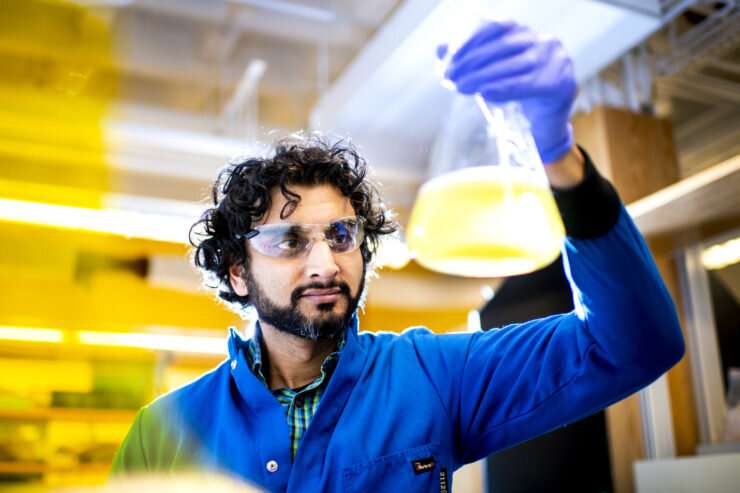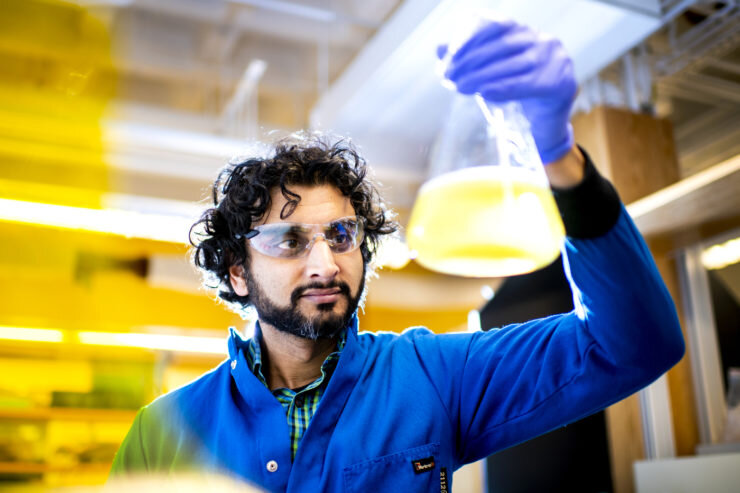
Across much of the world, childhood diarrhea is a major killer. Could a probiotic pill somehow be engineered to help stop the scourge in its tracks?
Scientists in Neel Joshi’s laboratory at Northeastern University are a step closer to developing such a remedy, according to a paper published in the Sept. 15 edition of the journal PLOS Pathogens.
The paper’s findings describe a new engineered probiotic treatment that would produce a “microbial net” studded with antibody proteins that would prevent illness by binding with pathogens that cause enteric diseases, says Joshi, associate professor of chemistry and chemical biology.
The idea is for the engineered treatment to be delivered orally. It would start working as soon as it hit the digestive system, Joshi says. “Our product is like a little factory that makes the drug inside the colon.”
The newly published research by Northeastern University in collaboration with the Tufts schools of medicine and of veterinary medicine proves that the concept works in the lab, says Ilia Gelfat, who took part in the research as a visiting scholar at Northeastern University.
The next step is to demonstrate that it works in live animals, Gelfat says.
“That’s something that’s in our immediate future plans,” Joshi says.
“It’s exciting because some pathogens, like Cryptosporidium, don’t have many options for treatment and others are starting to gain resistance against existing treatments,” Gelfat says.
Diarrhea caused by enteric diseases is the second leading cause of childhood death in the world, killing more than 2,000 children a day, according to the Centers for Disease Control and Prevention.
The overwhelming majority of the deaths are in low-income nations where clean water and proper sanitation are often not available.
“Globally, it’s a very big problem,” Gelfat says, adding that enteric diseases mostly kill children under the age of 5.
“Some effective vaccines exist, but not for many of the most relevant bacterial and parasitic pathogens, so alternative strategies are in high demand,” Joshi says.
Tufts scientists in the Charles Shoemaker and John Leong labs have come up with a way to harvest special antibody sequences, known as VHHs, from immunized alpacas to bind to some of the most prevalent disease-causing pathogens that plague young children from low-income countries, Joshi says. The pathogens include the Shigella bacterium and the Cryptosporidium parasite.
Joshi’s lab came up with a way to program a probiotic beneficial bacteria known as E. coli Nissle to both produce VHH antibodies and to secrete biofilm to make fibers, known as curli fiber, for the netlike scaffolding on which antibodies lie in wait for pathogens, Gelfat says.
“Imagine a net. Now you have a bunch of magnets on the net,” Gelfat says.
The research, published in PLOS Pathogens, took years to finish and started when Joshi and Gelfat were at Harvard University, where Gelfat was Joshi’s Ph.D. student. Joshi moved his lab to Northeastern in early 2020.
The paper leverages the expertise of Tufts scientists to find new VHH antibodies that bind new targets and validate them, Gelfat says. In a nutshell, the process involves immunizing alpacas against pathogenic targets, waiting for them to develop antibodies and taking and screening their blood, he says.
“It’s basically like drawing a blood sample when we donate blood,” Gelfat says.
Why alpacas?
It turns out that camelid species including alpacas and llamas make a very simple type of antibody that even bacteria—including beneficial bacteria—can be engineered to produce, Gelfat says.
Normally therapeutic proteins such as VHH antibodies have to be delivered by injection—think of the medicine Humira, Joshi says. He says the process “is not viable for widespread distribution in poorer countries.”
Engineering the probiotic E. coli Nissle to produce the VHHs, also known as nanobodies, in the gut solves that problem and creates the opportunity for an oral therapeutic, Joshi says.
“It’s a delivery vehicle that allows the protein to reach the lower intestine,” he says.
Joshi says he has used a similar platform to develop a possible treatment for inflammatory bowel disease under the auspices of Tantu Therapeutics, which received seed money from Northeastern to get off the ground.
Source: Read Full Article
